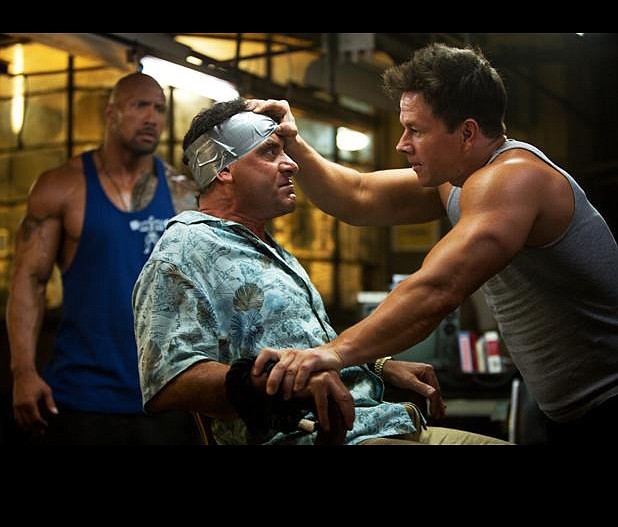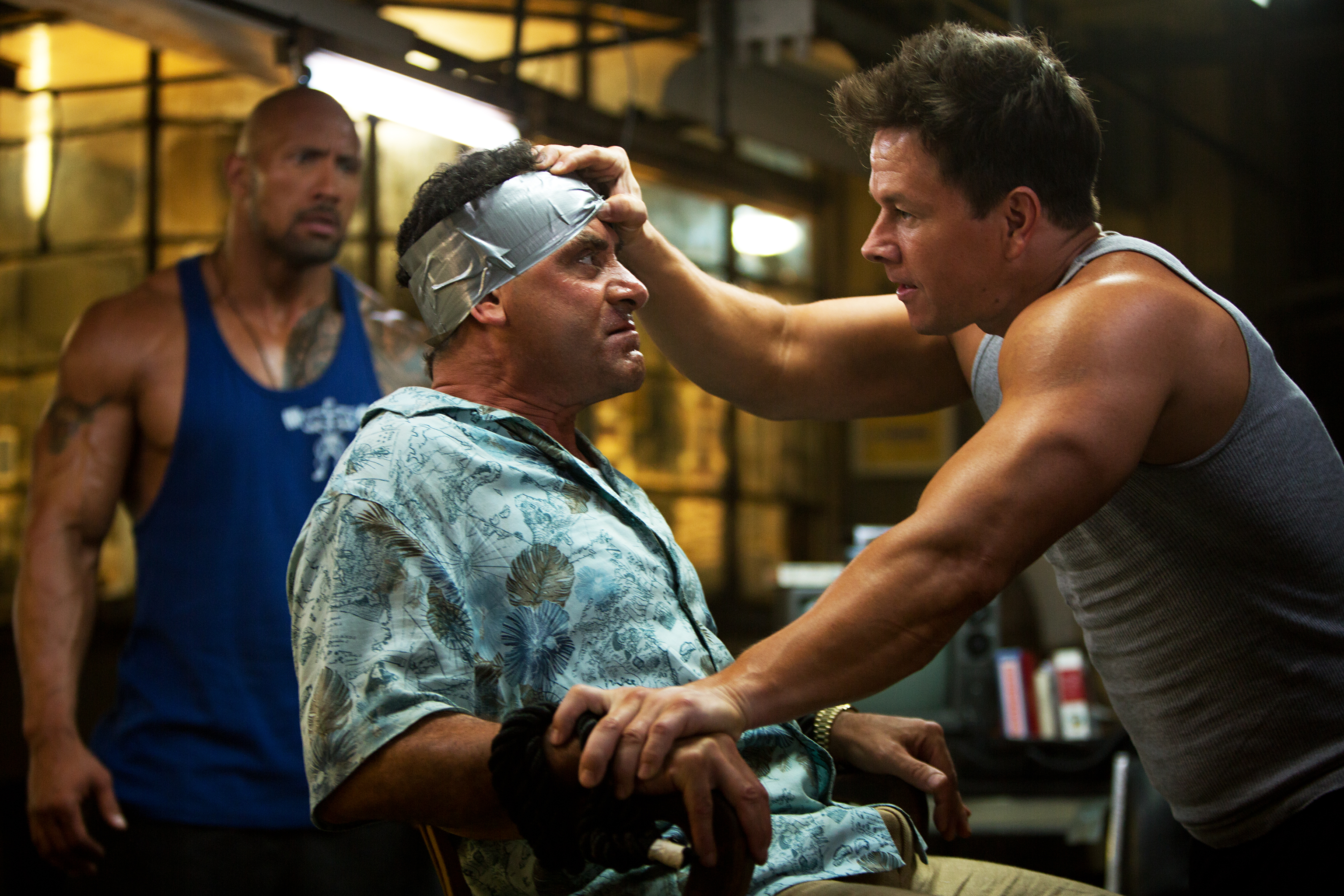About Ed Du BoisDu Bois is a private detective based in Miami. His daughter, Christy Falco, lives in Chattanooga. In addition to being part of the "Pain & Gain" story, Du Bois has written a song called "Pain and Gain -- Retribution Song" that tells part of the tale. While visiting his daughter last year, he had local musician Tim Jester add a fiddle part to the song. The original plan was to use the song in the movie, "but it didn't work," Du Bois says. "It's too upbeat." You can find links to the Miami New Times story and hear the song at eddubois.com.
Ed Du Bois has long and short versions of the story.
It's a true tale of how a group of bodybuilders met in a Miami gym, came up with a scheme to kidnap and torture a rich man, forcing him to sign over most of what he owned to them. When they got away with it -- or thought they did -- they decided to do the same thing to another couple. But those people died.
"The short story is that some bodybuilders decided to get a side business going and two people died," DuBois says. "But the short version leaves out such great side stories of the darker side and the human side."
The tale, which writer Pete Collins first unveiled in articles published in December 1999 and January 2000 in the Miami New Times, is now onscreen in "Pain & Gain," the latest movie by director Michael Bay (the "Transformers" franchise) which opens nationwide today. It stars Mark Wahlberg, Dwayne Johnson, Anthony Mackie and Rebel Wilson as the main "bad guys," Ed Harris as Du Bois, a private investigator who looked into the case, and Tony Shalhoub as the victim. It's based partly on the New Times article.
"It's my story," says Du Bois, whose daughter lives in Chattanooga. "Pete and I wrote it, but the prosecutor demanded I take my name off of it" because his being a part of the writing team complicated the criminal case.
Du Bois says seeing the movie -- whose events took place in '94 and '95 -- was mentally tough.
"I understand it has to be commercially viable, but I know there is so much more to the story," he says in a telephone interview from Miami just after the premiere of "Pain & Gain." "The first time I saw it, even though I know the story, I was stunned. By the end I was emotionally drained.
"It's like watching 'Pulp Fiction.' You watch it and something happens and you go 'What the (expletive deleted) just happened?' You are so in shock."
In an interview with the Detroit Free Press, Bay says he wanted to make the movie after reading the New Times articles.
"It's not your normal movie," he said. "It's a wild ride. You go into the criminals' minds and sometimes you sympathize with them and you see their psychoses.
"It's showing all these gray areas of criminals where they think they're better than other people," he continued. "They think they can have a wonderful, loving wedding and the very next day they can have a guy tied up in a factory or warehouse and try to extort him. It's a bizarre lifestyle."
The long version -- some of which is in the movie; some not -- details how the bad guys, led by Adrian Doorbal and Daniel Lugo, botched seven attempts at kidnapping a man named Marc Schiller then, after finally succeeding, kept him captive for a month, torturing him in a Miami warehouse in an effort to get him to sign away his house and fortune. It includes how, when they'd finished taking everything from Schiller, they poured alcohol down his throat for three days, loaded him into a car and tried to stage an accident they hoped would kill him.
They failed and decided to pour gasoline on the car -- with Schiller still in it -- and light it. They pulled away, only to see him open the car door and step out. So they chased him around the parking lot with their car. Drunk and badly injured, Schiller managed to avoid being hit for awhile -- more because he simply tumbled out of the way than because of any type of heroics.
They eventually ran over him -- twice -- before driving off when a car approached. But they still didn't kill him and, when they didn't see news accounts of Schiller's death, they started checking area hospitals.
That's where De Bois enters the story. An attorney told Schiller that he should call a private detective to help him catch the kidnappers and retrieve his money and belongings, including his house, which some members of the bodybuilding gang were now living in.
Schiller called Du Bois, who says he thought he'd heard everything until that phone call. Naturally suspicious, he still realized that, if the story were true, the gang would be looking for Schiller and would likely stop at nothing to kill him or anyone who got in the way. He arranged to have Schiller flown to a hospital in New York, where he asked Schiller to write down his story and send any proof he had of its validity.
Du Bois says the details gave him more reason to believe Schiller, but the accompanying copies of the canceled checks and insurance forms Schiller had signed as part of the extortion plan provided more proof. Schiller was badly beaten and blindfolded when he signed the papers, so most of the signatures were not near the so-called dotted line; one even runs vertically up the page.
Du Bois was now convinced of Schiller's story and he was certain Miami police and perhaps the FBI would be too. They were not.
"That is the crazy part and the part of the story that hasn't been really told," Du Bois says. "I gave them [the police] more evidence than I'd ever given them and they didn't act."
Du Bois even confronted members of the gang with the evidence. They denied the allegations during the first meeting but offered to give back $1 million to Schiller, who was in hiding out of the country, if he and Du Bois promised not to go to the cops. It was merely a stall tactic to give them time to find and kill Schiller, Du Bois says.
"They were so flippant about it all," he says.
The gang was so sure of itself and its ability to not get caught, it decided to try a similar scheme on a local couple, Frank Griga and his girlfriend Krisztina Furton. They planned to do the same thing to them that they had done to Schiller, but after kidnapping the couple, they accidentally killed them by overdosing them with horse tranquilizer. They cut up the bodies with a chainsaw and a hatchet, put their heads and torsos in 55-gallon drums and dumped them in a river, then fed their hands and feet to alligators.
Lugo and Doorbal are "10 times more evil than those guys in Boston," Du Bois says, referring to Tamerlan and Dzhokhar Tsarnaev, the suspects in the Boston Marathon bombings.
The real story of what happened is like something out of a Coen Brothers movie and is a big reason why "Pain & Gain" is a dark action-comedy, which does not sit well with Schiller.
"Making these guys look like nice guys is atrocious," Schiller told the Huffington Post.
Bay said he wanted the audience to be conflicted about the characters, pointing out that Wahlberg's character, in the midst of his horrible activities, forms a neighborhood watch.
"There's a sweet side to this guy, but he's so bad," Bay said. "That's what I was really trying to show. There's different levels to life, and darkness sometimes lurks in real places."
Du Bois acknowledges that the story is not funny, especially since people died, but says it is hard to make a movie about it without seeing the humor, dark as it is.
"Schiller is offended and I can understand that," Du Bois says.
Contact staff writer Barry Courter at bcourter@timesfreepress.com or at 423-757-6354.

